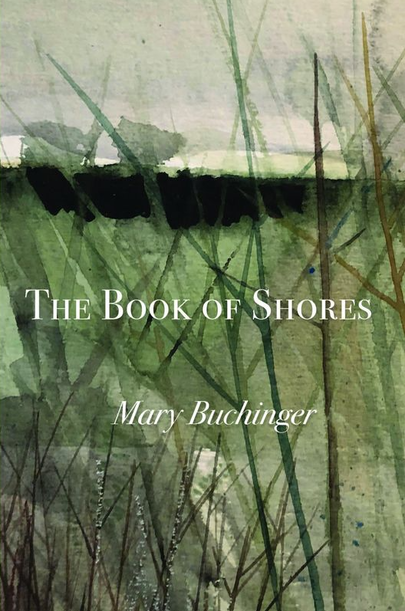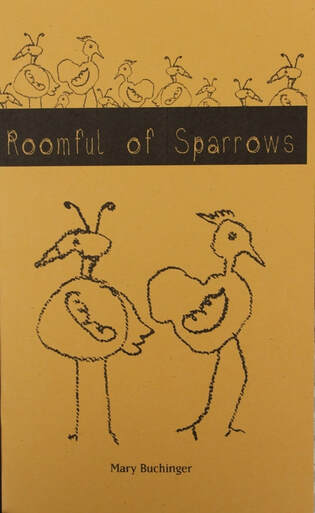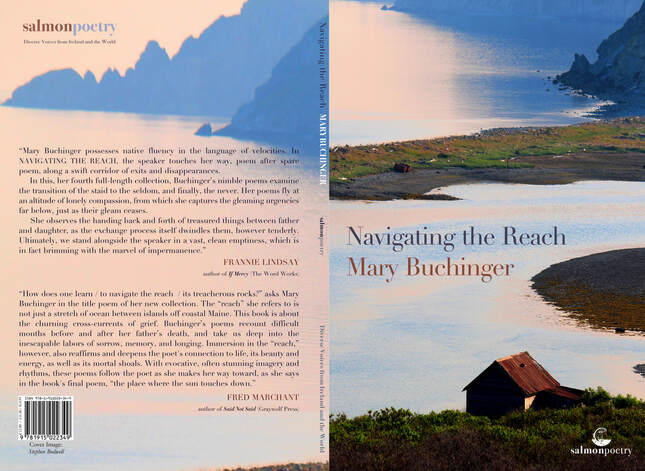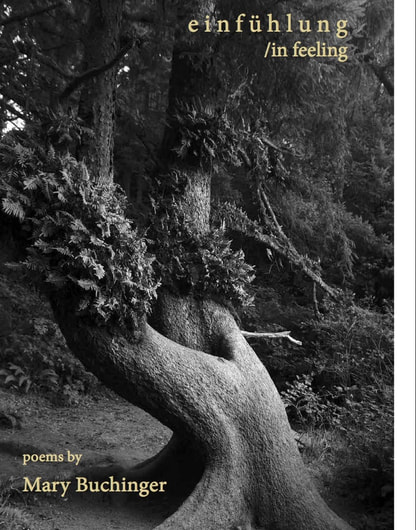
Praise for The Book of Shores
Mary Buchinger’s collection of poems, The Book of Shores, begins with a thirteen-page poem that defines the metaphysical journey the poet wants to take us on, alongside her, as witness. These are not easy poems. Not simply Homer’s outward journey towards nostos, the poet here journeys deep into the heart of the country, and into the uncertain heart of things. In this beautifully cluttered cataloging of resonant images from our post-modern lives, the poet fashions herself a Whitman for our age, for the poems’ wide-ranging democracy of spirt, and for her unequivocal faith in the rawness of our American diction. I relish these poems. They deserve at least our attention.
—Bruce Weigl, author of Among Elms, In Ambush
Early in The Book of Shores, Mary Buchinger admits, “when I reach the bottom of the ladder / I have no idea / what to say.” In this book, humility dances intimately with faith—a faith in language, a faith in love, a faith in the relationships we build with our human and nonhuman kin, and, most fundamentally, a faith in care. Buchinger’s long, contemplative poems interweave inventive and experimental syntax with lyric musicality; they wrestle with threats and terrors on scales that range from the microscopic and the individual to the massive and the collective, ruminating upon climate change, colonialism, racism, opioid epidemics, and mass shootings with tenderness and attentiveness. These poems are a testament to a mind in motion—and an invitation to join its walks.
--Sumita Chakraborty, author of Arrow: Poems
Mary Buchinger’s The Book of Shores is a meditation into the nature of being, one that recognizes that “there once was a self/ known only to self// who carried the sea/ wherever she went.” The verses in this collection are both restless and still, formally inventive and thrumming with lines that are “always talking/ about more than one thing.” It’s a collection that takes risks to name the ineffable, to chart the topography of one’s interior landscape, to “[l]ift its lithosphere/ as you would/ the lid of a chest” so that we might explore “within its rifts and/ escarpment something in there/ making new an immensity/ that will not diminish.”
—Brian Turner, author of The Wild Delight of Wild Things
RICHARD HOFFMAN'S INTRODUCTION
Grolier Bookshop, Cambridge, MA, February 15, 2024 (YouTube recording)
Buchinger follows a meandering narrow path earlier trod by Dickinson, H.D., A. R. Ammons, and Louise Glück, and it brings her close to the essence of things. The seven meditative sequences that make up The Book of Shores, are prayers of a kind, not petitions but praises and laments, heartfelt questions, evensong for our darkening time. It is her poetic practice to spin language in the centrifuge of her fierce attention, a process that isolates and questions meanings as they surface, that identifies and pairs opposing understandings. For example, in the book's second sequence, "Island," she writes,
There is always more
than you can see
each something
presents another
possibility
lamb in the grass
lamb on the plate
Whether she is walking a wrack line, or bearing witness to the stories water tells, or examining the skull of a moose, or musing on the inland remnant of an ancient sea, these are deeply philosophical poems. As she pursues her inquiry, the poet bears down on the language, over and over refusing what might betray the quick with the formulaic. These poems are original in the best sense of the term: they search for origins, as if only those arrangements of words that might lead back to beginnings can be trusted to reveal the essence of things.
By giving silence its due and by restraining all impulses toward rhetoric, Buchinger's poems offer us again and again a blade thin enough to pry open the seams of the familiar and see for ourselves what is suddenly grievous and terrifying; singular, beautiful, mortal, and precious. Sometimes it seems as if these are the tentative, careful, but honest and important words one searches for when speaking, intimately, to the grieving — which, of course, is each and every one of us.
--Richard Hoffman, author of People Once Real
Excerpts
In the fulness of time:
stones stacked
one by one
across a rivulet
recruitment
of sticks and mud
what small hands
can find
for whole
moments
the water
seems baffled
halting
as it builds up
steady
against the pieced-
together dam
Available from Lily Poetry Review Books
Review of The Book of Shores, by Thomas DeFreitas
Mary Buchinger’s collection of poems, The Book of Shores, begins with a thirteen-page poem that defines the metaphysical journey the poet wants to take us on, alongside her, as witness. These are not easy poems. Not simply Homer’s outward journey towards nostos, the poet here journeys deep into the heart of the country, and into the uncertain heart of things. In this beautifully cluttered cataloging of resonant images from our post-modern lives, the poet fashions herself a Whitman for our age, for the poems’ wide-ranging democracy of spirt, and for her unequivocal faith in the rawness of our American diction. I relish these poems. They deserve at least our attention.
—Bruce Weigl, author of Among Elms, In Ambush
Early in The Book of Shores, Mary Buchinger admits, “when I reach the bottom of the ladder / I have no idea / what to say.” In this book, humility dances intimately with faith—a faith in language, a faith in love, a faith in the relationships we build with our human and nonhuman kin, and, most fundamentally, a faith in care. Buchinger’s long, contemplative poems interweave inventive and experimental syntax with lyric musicality; they wrestle with threats and terrors on scales that range from the microscopic and the individual to the massive and the collective, ruminating upon climate change, colonialism, racism, opioid epidemics, and mass shootings with tenderness and attentiveness. These poems are a testament to a mind in motion—and an invitation to join its walks.
--Sumita Chakraborty, author of Arrow: Poems
Mary Buchinger’s The Book of Shores is a meditation into the nature of being, one that recognizes that “there once was a self/ known only to self// who carried the sea/ wherever she went.” The verses in this collection are both restless and still, formally inventive and thrumming with lines that are “always talking/ about more than one thing.” It’s a collection that takes risks to name the ineffable, to chart the topography of one’s interior landscape, to “[l]ift its lithosphere/ as you would/ the lid of a chest” so that we might explore “within its rifts and/ escarpment something in there/ making new an immensity/ that will not diminish.”
—Brian Turner, author of The Wild Delight of Wild Things
RICHARD HOFFMAN'S INTRODUCTION
Grolier Bookshop, Cambridge, MA, February 15, 2024 (YouTube recording)
Buchinger follows a meandering narrow path earlier trod by Dickinson, H.D., A. R. Ammons, and Louise Glück, and it brings her close to the essence of things. The seven meditative sequences that make up The Book of Shores, are prayers of a kind, not petitions but praises and laments, heartfelt questions, evensong for our darkening time. It is her poetic practice to spin language in the centrifuge of her fierce attention, a process that isolates and questions meanings as they surface, that identifies and pairs opposing understandings. For example, in the book's second sequence, "Island," she writes,
There is always more
than you can see
each something
presents another
possibility
lamb in the grass
lamb on the plate
Whether she is walking a wrack line, or bearing witness to the stories water tells, or examining the skull of a moose, or musing on the inland remnant of an ancient sea, these are deeply philosophical poems. As she pursues her inquiry, the poet bears down on the language, over and over refusing what might betray the quick with the formulaic. These poems are original in the best sense of the term: they search for origins, as if only those arrangements of words that might lead back to beginnings can be trusted to reveal the essence of things.
By giving silence its due and by restraining all impulses toward rhetoric, Buchinger's poems offer us again and again a blade thin enough to pry open the seams of the familiar and see for ourselves what is suddenly grievous and terrifying; singular, beautiful, mortal, and precious. Sometimes it seems as if these are the tentative, careful, but honest and important words one searches for when speaking, intimately, to the grieving — which, of course, is each and every one of us.
--Richard Hoffman, author of People Once Real
Excerpts
In the fulness of time:
stones stacked
one by one
across a rivulet
recruitment
of sticks and mud
what small hands
can find
for whole
moments
the water
seems baffled
halting
as it builds up
steady
against the pieced-
together dam
Available from Lily Poetry Review Books
Review of The Book of Shores, by Thomas DeFreitas
|
About Navigating the Reach
The lyric and narrative poems in this volume take the reader on a journey across geographies, years, and states of mind. The “reach” in the title refers to a treacherous stretch of water between two bays on the Maine coast. With its tidal currents and rocky outcroppings, the reach holds visible and invisible complications. These elegiac poems limn the navigation of passageways—between what is and what was; memory and loss; self and other—and demonstrate how close attention, care, feeling, and intuition can move us forward, though the journey is never without risk. Praise for Navigating the Reach Mary Buchinger possesses native fluency in the language of velocities. Navigating the Reach, the speaker touches her way, poem after spare poem, along a swift corridor of exits and disappearances. In this, her fourth full-length collection, Buchinger’s nimble poems examine the transition of the staid to the seldom, and finally, the never. Her poems fly at an altitude of lonely compassion, from which she captures the gleaming urgencies far below, just as their gleam ceases. She observes the handing back and forth of treasured things between father and daughter, as the exchange process itself dwindles them, however tenderly. Ultimately, we stand alongside the speaker in a vast, clean emptiness, which is in fact brimming with the marvel of impermanence. — Frannie Lindsay, author of If Mercy (The Word Works) “How does one learn / to navigate the reach / its treacherous rocks?” asks Mary Buchinger in the title poem of her new collection. The “reach” she refers to is not just a stretch of ocean between islands off coastal Maine. This book is about the churning cross-currents of grief. Buchinger’s poems recount difficult months before and after her father’s death, and take us deep into the inescapable labors of sorrow, memory, and longing. Immersion in the “reach,” however, also reaffirms and deepens the poet's connection to life, its beauty and energy, as well as its mortal shoals. With evocative, often stunning imagery and rhythms, these poems follow the poet as she makes her way toward, as she says in the book's final poem, “the place where the sun touches down.” --Fred Marchant, author of Said Not Said (Graywolf Press) Available from Salmon Poetry Review of Navigating the Reach by Sharon Tracey in MER |
|

About Virology
“What will you teach us, O Plague?” is the central question in VIROLOGY. In the first year of the COVID-19 pandemic, each day offered up startling revelations of science and society. We learned that we can harm and be harmed by what we cannot see and what we choose not to see; that the world is made of worlds. We learned about connection and separation; that we live and dream in interdependent spheres; that what is peripheral can become central. These are poems of paying attention within a shifting landscape that asks us, Who are you? Who are you today? Lifting up the definition of a virus as an “organism on the edge of life,” this collection leads us to wonder, What else lives on life’s edge? How can an examination of the edges bring us closer to an understanding of the heart?
Praise for Virology
These poems are serious the way flowers are. They build from an inner sensitivity to measurements, unrealized forms, to what it is that lies under the limits and expand what it is we can touch and see. I found much pleasure in sitting back with them, with analyzing and holding them at a distance so I could see what they had made of themselves. Out of sickness (o rose) into health.
—Fanny Howe, author of Manimal Woe and Love and I
This is a work that demands that we be as present within its pages as we are within our waking reality. It brings together a certain kind of mythic and tale within tight verse enclosed within a depth of language. Science and reality, especially within our now, does not always feel intimate, and yet, Virology makes this possible in immersive ways.
—Shanta Lee Gander, author of GHETTOCLAUSTROPHOBIA: Dreamin of Mama While Trying to Speak Woman in Woke Tongues and Black Metamorphoses
Available from Lily Poetry Review Books
“What will you teach us, O Plague?” is the central question in VIROLOGY. In the first year of the COVID-19 pandemic, each day offered up startling revelations of science and society. We learned that we can harm and be harmed by what we cannot see and what we choose not to see; that the world is made of worlds. We learned about connection and separation; that we live and dream in interdependent spheres; that what is peripheral can become central. These are poems of paying attention within a shifting landscape that asks us, Who are you? Who are you today? Lifting up the definition of a virus as an “organism on the edge of life,” this collection leads us to wonder, What else lives on life’s edge? How can an examination of the edges bring us closer to an understanding of the heart?
Praise for Virology
These poems are serious the way flowers are. They build from an inner sensitivity to measurements, unrealized forms, to what it is that lies under the limits and expand what it is we can touch and see. I found much pleasure in sitting back with them, with analyzing and holding them at a distance so I could see what they had made of themselves. Out of sickness (o rose) into health.
—Fanny Howe, author of Manimal Woe and Love and I
This is a work that demands that we be as present within its pages as we are within our waking reality. It brings together a certain kind of mythic and tale within tight verse enclosed within a depth of language. Science and reality, especially within our now, does not always feel intimate, and yet, Virology makes this possible in immersive ways.
—Shanta Lee Gander, author of GHETTOCLAUSTROPHOBIA: Dreamin of Mama While Trying to Speak Woman in Woke Tongues and Black Metamorphoses
Available from Lily Poetry Review Books

About / klaʊdz /
The making of meaning from ephemera is a deeply human activity. The poems in this collection arise from this impulse. The title / klaʊdz / is the phonetic transcription of ‘clouds’— the symbols indicate how to pronounce the word. Like clouds, sounds are re-combinable elements with shifting meanings and outcomes both consequential and transient, as well as subject to randomness and governed by physics. Each poem plays with its subject— roams within its confines and pushes against (sometimes through) the walls of its meanings. The topics range from the concrete— “hive,” “camisole,” “lantern”— to the abstract— “resurrection,” “absence,” “derivation.”
Praise for / klaʊdz /
Each poem in Mary Buchinger’s / klaʊdz /, is a meditation in which shapes of thought enter the mind and then recede— as if gazing at a solitary cloud forming into an image always a breath away from dissolving. These wondrously challenging poems are definitional yet amorphous, terse, yet expansive. They are stunning helixes of sound and language twisting together and scattering, thinning and thickening like a congregation of starlings. And like starlings, they are eerily beautiful— and in flight.
--Regie O'Hare Gibson, author of Storms Beneath The Skin
Available from Lily Poetry Review Books
Review of / klaʊdz / by David P. Miller
|
Praise for e i n f ü h l u n g/in feeling
Gathered under the transcontinental title einfühlung/in feeling, these poems serve as attestations to borders crossed, to exterior and interior landscapes spanned... Mary Buchinger is a dauntless traveler, unearthing extraordinary narratives buried deep within these terrains... —Danielle Legros Georges, Poet Laureate, City of Boston, author of the Dear Remote Nearness of You I/ too am nothing/ but an ecstasy made/ of webs, writes Mary Buchinger, and the poems in einfühlung/ in feelingexplore the delicate filaments that connect the past to the present, the self to the world. These poems grapple with the complexities of empathy and the realization that there is no recipe for transcendence... —Ben Berman, author of Figuring in the Figure Available from the author. Email [email protected] |
 Finishing Line Press, 2008
Finishing Line Press, 2008
Praise for Roomful of Sparrows
Mary Buchinger’s poems bring the outdoors lovingly indoors. They bring the goldfish to his bowl, the pet snail to his tank, the hyena to the children’s board game. This is not dislocation, it is domestication. Even the moths beat their “white wings” against the screen to get into her poems. With her delicate perceptions of the tiny and microscopic, Buchinger invites us to see, if not the universe in a grain of sand, then possibly the halo about the humble sidewalk pigeon. At such times she is truly a mystic poet.
--Victor Howes, author of The Lobsterman's Daughter
These beautiful poems shine with intelligence, as they connect human and animal, natural and spiritual worlds. A poet of contrasts, whose knowledge of science adds distinction to her voice, Buchinger turns an ordinary city morning into a pastoral (Sequence), a sidewalk pigeon into a meditation on the soul (“Redeem/ the unread vision in the higher dream”). Celebrating life with wit and love while acknowledging its transience, Buchinger is in essence a seeker of alliances among all living creatures. Her fine book makes us aware that we are interdependent, that we must spend our brief time together in “this roomful of sparrows/ too close to sorrow.”
--Susan Donnelly, author of Transit
Available from the author
Email [email protected]


